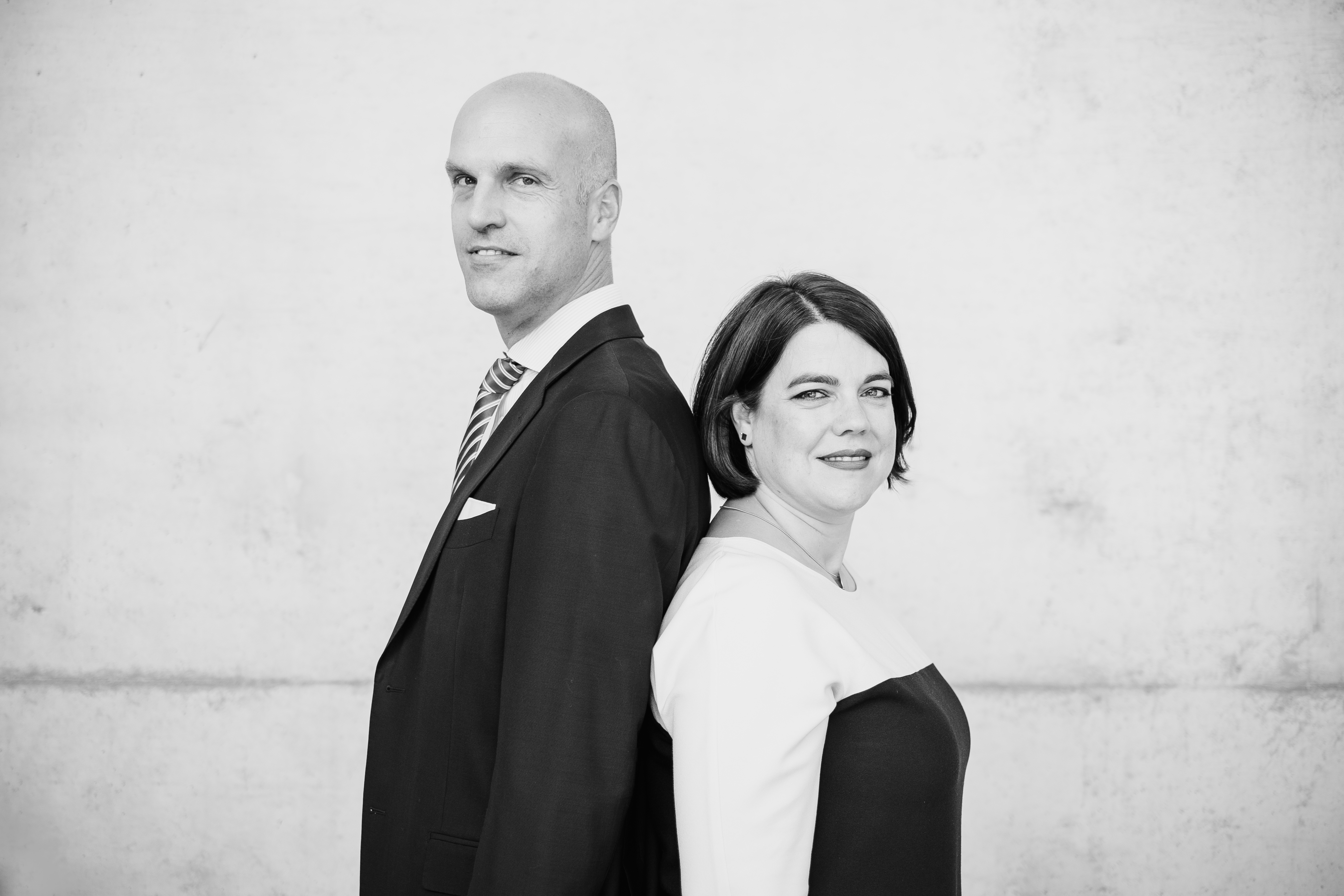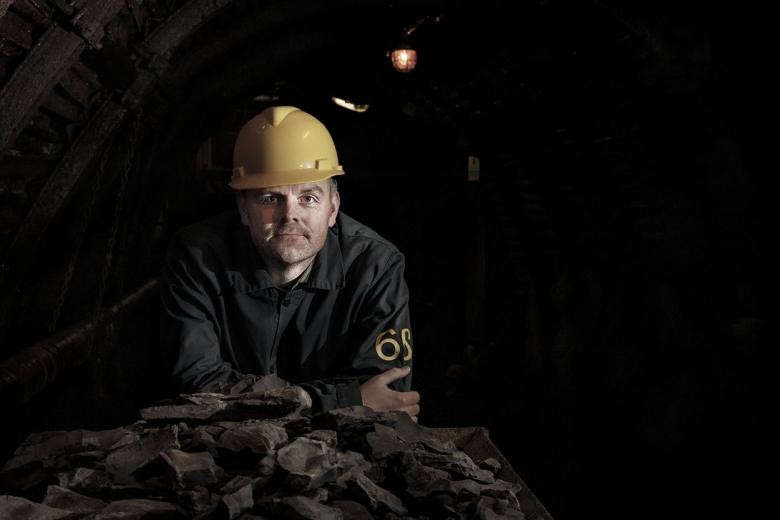Cheers, and two chairs, for professors Brüggen and Brüggen
One of the highlights in an academic’s life, an inaugural lecture is both a formal and a joyful event; a singular opportunity to stand alone onstage and share one’s scholarly insights with peers, friends and family. On 14 September, however, the Aula’s spotlight will be shared by two Maastricht University School of Business and Economics academics rather than reserved for just one.

But rather than dividing the glory in half, the event promises to be at least twice as special, because the two scholars in question are not only each others’ peers but their spouses, too. So in honour of the inaugural lectures of Alexander Brüggen and Lisa Brüggen, professor of accounting and information management and professor of financial services respectively, we invited both of them to give their frankest replies to the same eight questions.
1. How old were you the first time you spoke in public?
Lisa Brüggen: “Apparently in kindergarten I very much enjoyed being on stage. My mom told me that whenever they were looking for volunteers for a performance, an act, or whatever, my sister and I would volunteer. We did not really have a lot of presentations in school, so I had very little experience when I came to Maastricht. I still recall my first presentation, which I put together in Word and printed on overhead slides. I got lots of recommendations for improving! Since I’ve always admired good speakers, I worked hard over the years (and still do) to improve my public speaking abilities.”
Alex Brüggen: “I was playing in a sketch in primary school in front of all the parents and teachers. It went quite well. I was playing a rich woman in a restaurant being confronted by a stupid waiter…. Kind of a classic slapstick situation. The more serious talks came much later. During my finals in high school I had my first oral exam in German. I was asked to interpret a poem from the Middle Ages, and I had to prepare a 30-minute talk answering a number of questions. It was a disaster, and my teacher asked me whether I'd lost my mind.”
2. How is an inaugural lecture different to a regular lecture, and how will you know if you have done a good job?
Lisa Brüggen: “It’s different to a lecture because it is not just about research that I or others have done, but also about my vision for the field and what type of research should be done. I also plan to talk about how I want to carry out research and education in my field. Since my inaugural address will be about retirement planning, I’ll know if I have done a good job if at least one of the non-experts in the room checks www.mijnpensioenoverzicht.nl afterwards, and starts planning for their retirement.”
Alex Brüggen: “It is a more formal lecture, I think, as it is quite a celebratory moment. The audience is very diverse, and it allows you to talk about the ‘big picture’ of your research domain. In other lectures the topic is usually much narrower and the audience a little more homogeneous. I am not sure if I will ever find out whether I have done a good job. People don’t generally come up to you afterwards and tell you that you’ve screwed it up! What is important for me is that I have the feeling that I have brought across a message clearly, that the majority of the audience does not fall asleep or leave, and that I provide some sort of infotainment.”
3. What will we know after we have heard your lecture that we didn’t know before?
Lisa Brüggen: “That it only takes three steps and is very easy to get an overview of where you stand with respect to your retirement planning. And that I have a large family!”
Alex Brüggen: “My vision on the area of management accounting. That’s what an inaugural speech is all about.”
4. What is the best, worst or most unusual thing about being married to a fellow academic?
Lisa Brüggen: “The best is that you have a very good understanding about all the ups and downs of an academic career. From rejections to travel to evening conference calls, we fully understand the meaning and relevance of all these things academics have to do, so we are also very supportive of each other. It is hard to think about the worst, but maybe it’s the fact that it’s a challenge not to talk about work too much, and instead to make sure we spend enough time together and talk about other things. As for the unusual thing: sometimes when I went along to doctoral defences or other events in Alex’s department, and talked to guests from abroad, they’d express surprise that Alex’s wife was attending the event. It didn’t occur to them that I might work in a related field and have the same job.”
Alex Brüggen: “The best is that you both have a pretty good understanding of the academic circus of conferences, publications, rejections, students, etc. I don’t really know what the worst thing is. We once tried to do a project together, but it was not a good idea. It is tempting to work together in research, but we realised that this would make the division between work and private much more difficult. So we don’t. We also do not talk about ‘our SBE’ all the time... although a little gossip now and then is nice!”
5. Describe your spouse in five words.
Lisa Brüggen: “Alex is humorous, nature-loving, confident, friendly and dependable.”
Alex Brüggen: “Lisa is goal-oriented, social, happy, generous and optimistic.”
6. Are your children impressed to have two professors in the family?
Lisa Brüggen: “Well, I asked them, and their response was ‘Why?’ I think they’ve got the right attitude. We told them that we are juf and meester (the Dutch titles for female and male schoolteachers), but for older kids. I guess they see that I am really passionate about my job. But we have never really talked to them about titles, which I don’t consider very relevant to myself.”
Alex Brüggen: “I think they are not. We explain our job to them as ‘like being a teacher at school, but with older students and some other things besides’. For them (and also for me and Lisa) it is simply a job, and nothing glamorous. We try to keep it that way.”
7. What can a professor do that mere humans (or assistant professors) cannot?
Lisa Brüggen: “I’d love to give you a funny answer for that one, but I’m just not very funny (and if I am, then it is probably in unintended ways). You should ask Alex about this one. One thing we do not share is our sense of humour (although I love the fact that Alex is very humorous). But I suppose you could say that professors can do things like... take a shower and call it work? Work with bright young people and call it work? Research whatever you are interested in and call it work?”
Alex Brüggen: “You can walk around in a weird robe with a big hat and not feel stupid.”
8. Imagine you have an unlimited research budget, unlimited time and unlimited data sets. What would you like to discover?
Lisa Brüggen: “Well, that’s a tough one. I think I’d stay in my current research area, since I am really passionate about this societally relevant question of how we can increase people’s engagement with retirement planning. And there are still a thousand questions that need to be answered. I would probably do more work into areas that are as yet unexplored and still need to be developed, using new and advanced techniques such as neuroscience: AI, blockchain and robo-advising are just some examples.”
Alex Brüggen: “If I had an unlimited research budget, I would fund research on how to ensure the global survival of bees, because as a beekeeper I am interested in more than just accounting. We don’t yet know the reason for the bee colony collapse disorder, and it is a potential threat to the well-being of all of us on earth.”
You are invited to join Alexander Brüggen and Lisa Brüggen on the occasion of their inaugural lectures, which will begin at 16:00 on 14 September in the Aula, Minderbroedersberg 4-6, Maastricht University. The event will be preceded by a symposium, Future-Proof Decision Making, held by the Human Decisions and Policy Design research theme, which runs from 10:45 to 15:00.
Text: K.M. Shook
Photo: © Michel Saive
Lees ook
-
“Uitbuiting komt overal voor”
Waarom doen mensen wat ze doen? Om deze complexe vraag te beantwoorden moet Hannes Rusch van alles een beetje zijn: econoom, bioloog, filosoof, wiskundige. Hij kreeg onlangs een ERC Starting Grant van 1,5 miljoen euro om een interdisciplinair theoretisch kader voor de beschrijving van...

-
“Koken voor anderen is zo fijn”
Aan de keukentafel van Burak Can, universitair hoofddocent Data Analytics and Digitalisation, is het een gezellige drukte. Er wordt in het Turks, Engels en Nederlands gepraat. “Ik praat Turks met mijn kinderen, mijn vrouw Ingrid Nederlands en wij praten onderling Engels met elkaar.” Op het menu...

-
Fijnstof is bepaald geen fijn stofje
Drie jaar achtereen bezochten Steffen Kühn en zijn collega’s een zeven weken durend schaaktoernooi in Keulen, om het verband tussen luchtvervuiling en cognitieve prestaties vast te stellen. De media doken gretig op de ietwat alarmerende resultaten, maar er waren nog meer gegevens nodig om de...
